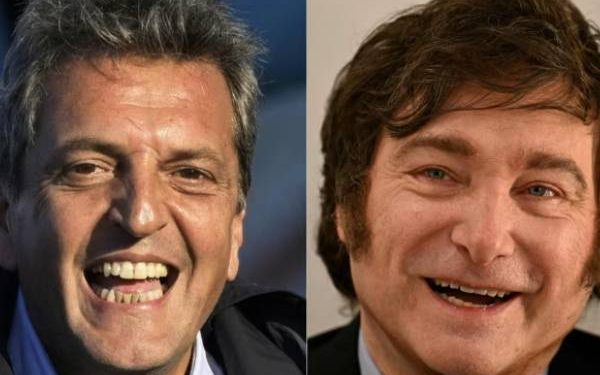Argentinians head to the polls to vote in a nail-biter presidential election race between embattled Economy Minister Sergio Massa and the libertarian outsider Javier Milei amid a crippling economic crisis.
The two men competing on Sunday represent starkly different futures for Latin America’s third-largest economy, creaking under triple-digit inflation after decades of debt, financial mismanagement and currency volatility.
Polls show the candidates in a dead heat, with Milei holding such a slight advantage that no one wants to predict an outcome.
Polling opens at 8am local time (11:00 GMT) and closes at 6pm (21:00 GMT), with results expected a few hours later.
Massa, 51, is a charismatic and seasoned politician seeking to convince Argentines to trust him despite his performance as economy minister, which has seen annual inflation hit 143 percent and record poverty levels.
His rival Milei is an anti-establishment outsider who has promised to halt Argentina’s unbridled spending, ditch the peso for the US dollar, and “dynamite” the central bank.
Milei, a 53-year-old economist, is a political newcomer who stunned observers by surging to the front of the electoral race just months ago.
He is often compared with former US President Donald Trump and Brazil’s Jair Bolsonaro, with Massa accusing him of aping the two politicians by raising the spectre of electoral fraud – for which he has provided no evidence.
The economist’s screeds resonated widely with Argentines angered by their struggle to make ends meet.
In a first-round election in October, Massa confounded the polls by coming first with almost 37 percent, while Milei scored about 30 percent of the vote.
Both have scrambled to shore up millions of votes from the three losing candidates.
Third-placed candidate Patricia Bullrich, from the powerful centre-right opposition, has thrown her weight behind Milei.
Milei has toned down his rhetoric to appeal to her more moderate voters, imploring the public not to give in to fear stoked by Massa’s campaign.
He previously said he was going to ditch those ministries entirely and was in favour of making it easier to carry guns and even sell human organs.
Massa represents the Peronist coalition, a populist movement heavy on state intervention and welfare programmes that has dominated Argentinian politics for decades.
He has sought to distance himself from the deeply unpopular outgoing President Alberto Fernandez and his Vice President Cristina Fernandez de Kirchner, who was last year convicted of fraud. Both have vanished from the public eye.





